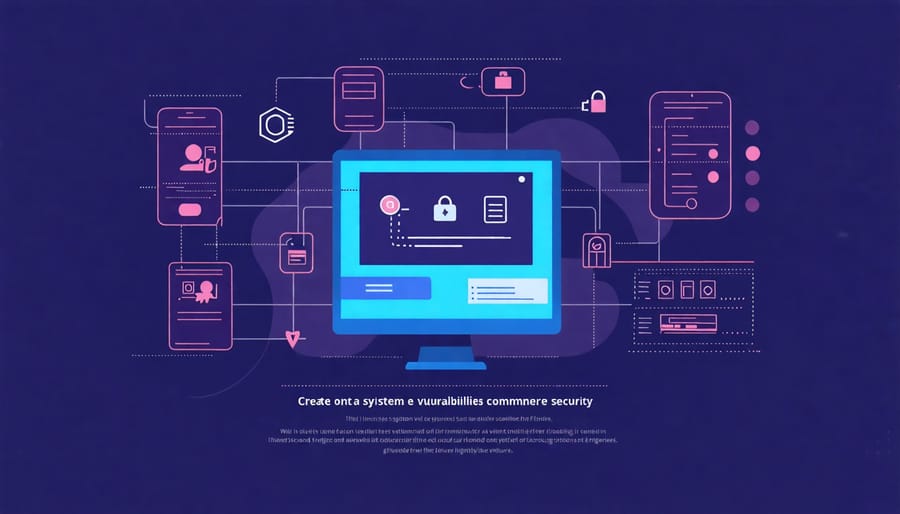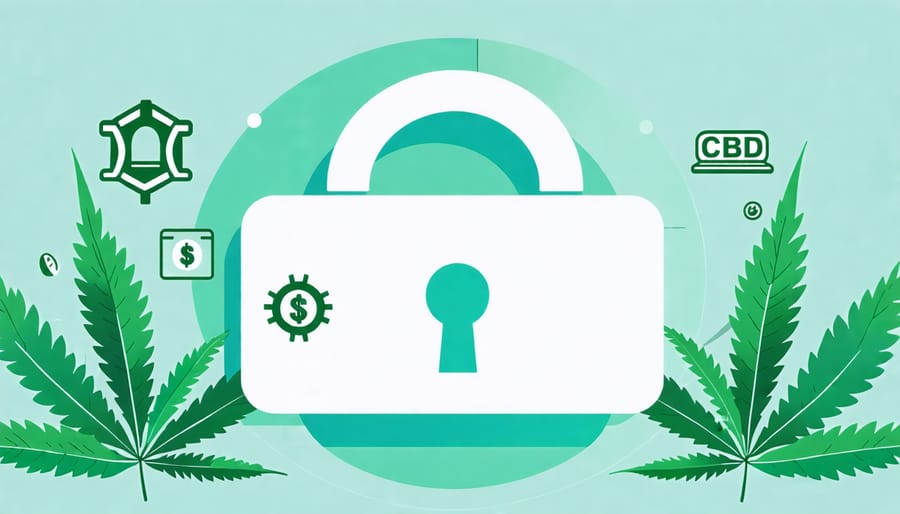Understand the cybersecurity risks associated with CBD transactions. Implement strong encryption protocols to secure payment gateways and protect customer data. Regularly update and patch systems to prevent vulnerabilities from being exploited. Conduct comprehensive security audits to identify potential threats and strengthen defense mechanisms. To further explore the benefits and safe acquisition of CBD products, discover more about budpop delta 8 gummies. Educate staff and customers on recognizing phishing attempts and fraudulent schemes. Explore zero-trust architecture, enhancing network security against unauthorized access. Integrate multi-factor authentication to bolster account security, significantly reducing the likelihood of breaches. By taking these steps, both consumers and sellers can significantly reduce the risks associated with online CBD sales.
Understanding CBD E-commerce Platforms

Vulnerabilities in CBD E-commerce Systems
CBD e-commerce systems face numerous vulnerabilities that threaten both user data protection and transaction security. A primary concern is the handling of sensitive customer information, such as personal details and payment credentials. Weak data encryption and inadequate access controls can lead to unauthorized access and data breaches. Furthermore, CBD platforms may be targeted by phishing attacks, where fraudsters create fake sites to steal user credentials unknowingly.
These systems must also contend with transaction security threats. Man-in-the-middle attacks pose a significant risk, allowing cybercriminals to intercept transactional data between customers and merchants. With the rapid proliferation of CBD products online, some platforms may rush to market without robust security measures, exponentially increasing their risk profile.
Industry experts recommend implementing multi-factor authentication, routine security audits, and comprehensive encryption protocols to fortify these systems. Real-world case studies highlight that rigorous compliance with industry standards significantly mitigates vulnerabilities. E-commerce platforms must stay vigilant and up-to-date with cybersecurity developments to effectively safeguard their ecosystem, ensuring that consumer trust and data integrity remain intact.
Impact of Data Breaches on CBD Businesses
CBD businesses, like many in the e-commerce industry, face significant risks from data breaches, which can cause both financial and reputational harm. In recent years, several high-profile incidents have highlighted the cybersecurity importance for such enterprises. A notable case involved a CBD company that suffered from a breach of their customer database, resulting in the exposure of sensitive customer information including payment details and personal data. This breach led not only to direct financial losses due to fraud but also to substantial legal costs, as the company faced lawsuits and regulatory fines.
Moreover, the reputational damage was severe; customer trust, once compromised, is hard to regain, leading to a drop in sales and market share. The incident underscored the need for robust cybersecurity measures. Another case demonstrated how a cyberattack on a CBD firm interrupted operations, causing significant revenue loss due to downtime. These examples emphasize that beyond immediate financial repercussions, businesses must consider the long-term impact on their brand and customer relationships, highlighting that proactive cybersecurity strategies are essential.
Cybersecurity Solutions for CBD Sellers
Implementing Secure Payment Systems
Implementing secure payment systems is crucial for safeguarding transactions in the CBD market, where sensitive customer data is often exchanged. One effective method is employing robust encryption technologies. By encrypting transaction data, businesses can ensure that any intercepted information is rendered unreadable to unauthorized parties. Incorporating advanced encryption protocols, such as SSL and TLS, into transactional processes provides an additional layer of security by protecting data during transmission.
Furthermore, utilizing secure payment gateways can significantly reduce cybersecurity risks. These gateways act as an intermediary between the merchant and the customer, handling payment processing and reducing the merchant’s exposure to sensitive card details. Selecting reputable gateways that comply with PCI DSS (Payment Card Industry Data Security Standard) guarantees adherence to industry standards and best practices for data protection.
Expert opinions suggest integrating two-factor authentication (2FA) for an added security measure, as it requires users to verify their identity through an additional method, enhancing security. By prioritizing these approaches, CBD businesses can better protect themselves and their customers from potential cyber threats.

Regular Security Audits and Compliance
Regular security audits are crucial in safeguarding against potential breaches in the CBD industry, where sensitive data from customers and sales transactions can be vulnerable. Compliance with established legal standards, such as the GDPR in Europe or HIPAA in healthcare-related sectors, helps in reinforcing data protection policies. By systematically evaluating security measures, organizations can identify weak points and implement effective strategies to enhance their cybersecurity infrastructure. Regular audits not only ensure adherence to legal mandates but also provide a proactive approach to risk management. Expert cybersecurity consultants emphasize that comprehensive audits and staying updated with compliance regulations both mitigate the risk of cyber threats and foster trust among consumers. Real-world examples demonstrate that businesses prioritizing security audits and compliance are better equipped to prevent data breaches and financial losses, ultimately securing their brand reputation.
Educating Employees about Cybersecurity
Educating employees about cybersecurity is a critical step in fortifying CBD businesses against cyber threats. Human error remains a significant vulnerability, often leading to data breaches and financial losses. Comprehensive training programs should focus on fostering a culture of security awareness, where employees understand the risks associated with handling sensitive customer information. Incorporating real-world case studies, such as previous incidents in the retail sector, can highlight the potential consequences of poor cybersecurity practices. Furthermore, regular workshops and simulations can help staff identify phishing attempts, recognize suspicious behaviors, and properly manage access controls. By investing in employee education, organizations not only reduce the likelihood of human error-related breaches but also empower their teams to act as the first line of defense in protecting valuable data assets.
The Role of Consumers in CBD Market Security

Identifying Trustworthy CBD Vendors
When purchasing CBD products online, identifying trustworthy vendors is crucial to ensure security and quality. Firstly, scrutinize the vendor’s online presence. Reputable sellers often maintain websites with detailed product information, transparent sourcing, and third-party lab results. Look for secure websites, indicated by a padlock icon in the address bar, to safeguard personal data during transactions. Explore customer reviews across multiple platforms to verify the vendor’s credibility and reliability. Trusted sellers are typically well-reviewed by a broad customer base, highlighting both positive and negative experiences. Verify that the vendor follows compliance regulations, ensuring products are legal and safe. For more comprehensive guidelines, check our CBD online safety tips. With vigilance and informed decisions, consumers can mitigate cybersecurity risks and find legitimate CBD sellers.
Protecting Personal Information Online
When shopping for CBD products online, it’s crucial to protect your personal information from cybersecurity threats. First, prioritize purchasing from reputable websites with robust security measures, such as SSL certificates, which encrypt data during transactions. Use strong, unique passwords for each of your accounts and enable two-factor authentication where possible. Avoid sharing excessive personal details; e-commerce sites typically require only basic information to process orders. Be wary of phishing scams disguised as CBD offers; these often appear as unsolicited emails or pop-ups. Always verify the legitimacy of any site by checking reviews and doing a background check on the company’s reputation. Regularly update your devices and security software to protect against vulnerabilities. By staying vigilant and informed, you can confidently navigate the digital marketplace while safeguarding your sensitive data.
Conclusion: Building a Secure Future for CBD Commerce
As the CBD industry continues to grow, the integration of robust cybersecurity measures is essential to safeguard both businesses and consumers in this dynamic market. This sector faces unique challenges, including regulatory complexities and the sensitive nature of consumer data, making proactive cybersecurity strategies crucial. By implementing comprehensive security frameworks, businesses can protect against potential threats such as data breaches and fraudulent activities, which are prevalent in digital commerce. Incorporating industry expertise, companies can adopt effective risk management practices, like end-to-end encryption and multi-factor authentication, ensuring that their digital infrastructure remains resilient against evolving threats.
Furthermore, fostering a culture of cybersecurity awareness among employees can significantly reduce risks by preventing common human errors. Highlighting real-world case studies reveals that successful defenses often result from a combination of advanced technology solutions and an informed workforce. As the industry embraces digital transformation, integrating cybersecurity with other strategic elements like SEO and cybersecurity enhances visibility while maintaining strong security postures. Ultimately, prioritizing cybersecurity is not merely a reactive measure but a pivotal step towards building a secure future for CBD commerce, fortifying trust between businesses and consumers and setting a benchmark for other emerging industries.
